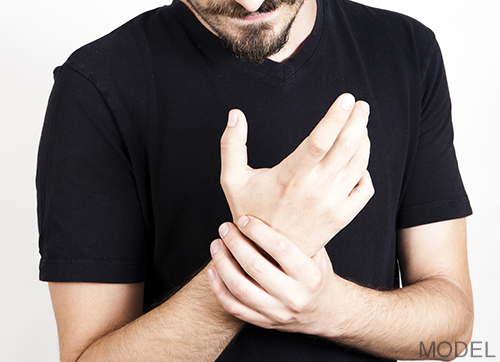Trigger Fingers
Conveniently located to serve Fort Worth
 The human hand is a very complex part of the body. While the task of flexing a finger might seem quite simple, there are numerous tendons at work helping us accomplish our daily tasks. Trigger finger occurs when an irritated tendon thickens, making it difficult to glide through the pulleys that surround it. As the tendon becomes more irritated, the tunnel in which passes also becomes irritated. All of this causes decreased motion in the affected finger, causing it to catch in a bent position and pop or snap when it’s opened. Depending on the severity of the symptoms, steroid injection can be the solution for trigger finger. Injections are done in the clinic, and surgery is done as an outpatient.
The human hand is a very complex part of the body. While the task of flexing a finger might seem quite simple, there are numerous tendons at work helping us accomplish our daily tasks. Trigger finger occurs when an irritated tendon thickens, making it difficult to glide through the pulleys that surround it. As the tendon becomes more irritated, the tunnel in which passes also becomes irritated. All of this causes decreased motion in the affected finger, causing it to catch in a bent position and pop or snap when it’s opened. Depending on the severity of the symptoms, steroid injection can be the solution for trigger finger. Injections are done in the clinic, and surgery is done as an outpatient.
Your Consultation
During the consultation with Dr. Lovelace, your fingers and hands will be assessed to diagnose the symptoms of trigger finger. You will be asked about your complete medical history and your daily experience to determine the best treatment plan.
Mild to moderate cases of trigger finger can be treated with splinting or steroid injections. Surgery may be recommended for severe cases.
Once your treatment program is finalized, you will be given special instructions on how to prepare for the session. Avoid non-steroidal anti-inflammatory medications a week before your treatment, and refrain from eating or drinking for at least 4 hours before your appointment.
If surgery is recommended to treat your trigger finger, stop smoking for at least 4-6 weeks before and after the procedure. Avoid drinking alcohol for at least 48 hours before and after the surgery.
Trigger Finger Treatment Aftercare
The aftercare needed will depend on the treatment program provided during the consultation. For non-surgical treatments, protect the injected area for 1-2 days. Avoid putting pressure on your fingers as much as possible.
Patients who are recommended for surgery will need 5-7 days of leave from work. Strenuous activities like heavy lifting or sports can be resumed 6 weeks after the procedure.
After completing your treatment or procedure, it is best to avoid activities that may bring back symptoms of trigger finger. Some of these activities involve repetitive gripping, grasping, or any vibrating handheld machinery.
If these activities are a part of your profession, consult with Dr. Lovelace to get recommendations on how to protect your hands and fingers.
Contact Us to Learn More
To get an assessment for trigger finger in Fort Worth, contact New Leaf Plastic and Reconstructive Surgery and schedule a consultation. Our team of medical professionals will be available to provide the best treatment to improve your condition.


